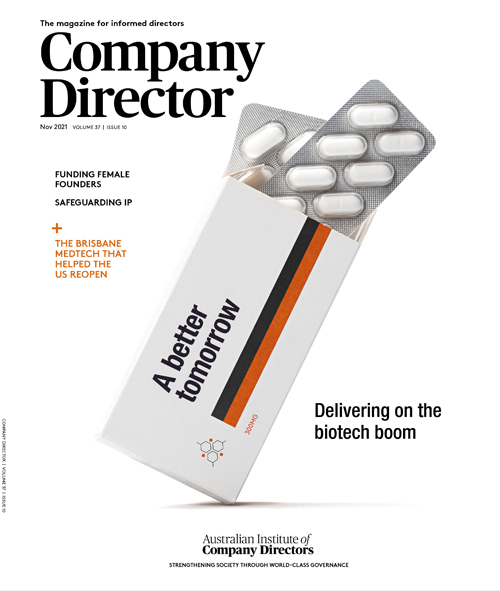The board’s role in governing innovation, climate change risk and prevention of workplace sexual harassment are important issues on the AICD agenda, writes Louise Petschler GAICD.
Climate risk governance insights
In August, the AICD launched the Australian chapter of the Climate Governance Initiative (CGI), a global network supported by the World Economic Forum. Through the CGI, the AICD aims to bring access to a global network of non-executive directors and support from experts on governance strategies.
The AICD’s Director Guide to Climate Risk Governance resource, developed with MinsterEllison, has had a strong response, with more than 2500 member downloads in its first month. The guide covers key climate change concepts and directors’ duties, and provides a framework for boards looking to increase their focus on climate risk. The guide also provides members with access to a board assessment tool developed by the UK network chapter.
Later this month, the AICD will release a new report — Climate Change Governance: Risk and Opportunity Insights from Australian Directors. Drawing on interviews with directors across different sectors and insights from a survey of AICD members, the research provides an overview of director views and approaches including case studies.
Members can access this and further resources at the Climate Governance Initiative Australia.
Governing for innovation
With guidance from the AICD Governance of Innovation and Technology Panel — an advisory forum of directors and experts, chaired by Kee Wong FAICD — the AICD is increasing resources and guidance to members on governing for innovation.
Lifting the digital capability of Australian boards is a key opportunity identified in our landmark 2019 Driving Innovation: the boardroom gap research report.
Directors on Digital, a podcast series produced by Company Director in partnership with Microsoft, brings insightful interviews with leading directors on the topic by Alan Kohler AM. Members can join more than 10,000 other subscribers at Directors on Digital.
A new AICD program is in development to support the digital effectiveness and literacy of directors — with a series of targeted webinars on digital governance, transformation and risks. The AICD is also researching the extent of deep digital skills on Australia’s leading boards.
Looking to 2022, the AICD is working with world-leading innovation experts to develop a practical handbook for directors on governing and supporting innovation. We will also refresh the 2019 Driving Innovation research and its recommendations — from building digital and technology literacy on boards to governance structures to boost focus.
On the regulatory front, the AICD continues to advocate for settings that promote considered risk-taking rather an overly cautious, compliance- driven mindset. Maintaining the 2017 insolvent trading safe harbour is key to this and we have highlighted the success of that measure in our submission to the independent review panel that is currently examining the safe harbour’s effectiveness.
Cyber resilience, and governance and regulatory responses to this growing challenge, are also a key focus — as discussed in last month’s column.
Preventing workplace sexual harassment
Important legislative changes to implement some of the Australian Human Rights Commission (AHRC) Respect@Work report recommendations passed federal Parliament in September. Changes to the Sex Discrimination Act 1984 that directors should be across include:
- An express prohibition on sex-based harassment (including harassment based on gender)
- Extension of protections to volunteers and interns (key for not-for-profits and charities)
- Coverage under the Act of members of state and federal parliaments, political staff, judges and public servants
- Any person who “causes, instructs, induces, aids or permits” someone else to engage in sexual harassment can now be found to have engaged in the unlawful conduct
- Making victimisation of complainants and others illegal
- Extending the time frame for complaints to the AHRC from six months to 24 months
- Related changes to the Fair Work Act 2009 make it clear that sexual harassment misconduct is a valid reason for employee dismissal in determining claims of harsh, unjust or unreasonable dismissal. Employees subject to sexual harassment may also now apply to the Fair Work Commission to issue a “stop sexual harassment order”, equivalent to the current “stop bullying order”.
The federal government committed in its response to further consider further Respect@Work recommendations. One key issue is the recommendation of a new positive duty under the Sex Discrimination Act that would require employers to take positive reasonable and proportionate measures to eliminate sex discrimination, sexual harassment and victimisation in the workplace, as far as possible.
The Law Council supports this proposal, while others have raised concerns about potential duplication with WHS laws. The AICD is developing its position and we welcome member views at policy@aicd.com.au
The AICD has issued valuable new tools and guidance on the board’s role in preventing workplace sexual harassment. Some key materials that we encourage members to review include:
- A director’s guide to preventing and responding to sexual harassment at work — a director tool to provide practical guidance to members
- Sexual Harassment in the Workplace — a practical roadmap from Clayton Utz on the board and legal considerations in creating a complainant centric approach.
Latest news
Already a member?
Login to view this content



